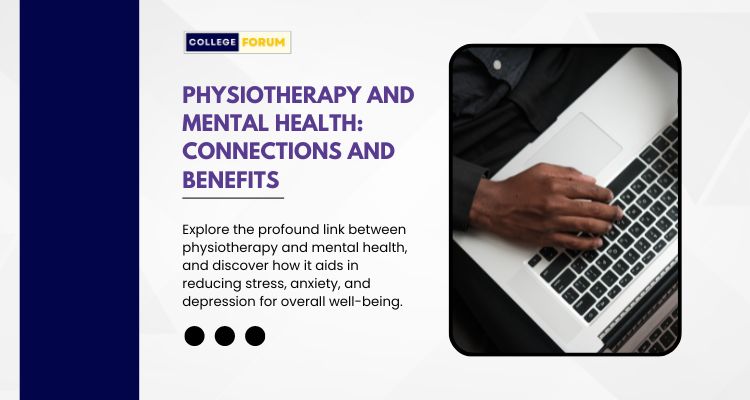In recent years, the importance of mental health has come to the forefront of public consciousness. With growing awareness, there is a pressing need to explore and understand the various ways through which mental well-being can be enhanced. One such avenue that has gained attention is physiotherapy. While traditionally associated with physical rehabilitation and pain management, physiotherapy has been increasingly recognized for its significant impact on mental health. This blog will delve into the intricate connections between physiotherapy and mental health and how this form of treatment can aid in reducing stress, anxiety, and depression.
Understanding Physiotherapy and Mental Health

Physiotherapy involves using physical methods such as exercise, manual therapy, and education to promote healing, restore function, and improve overall health. It is widely used to treat various conditions, including musculoskeletal injuries, neurological disorders, and chronic pain.
Mental Health encompasses emotional, psychological, and social well-being. It affects how individuals think, feel, and act, influencing their ability to handle stress, relate to others, and make decisions. Common mental health issues include stress, anxiety, depression, and more severe conditions like bipolar disorder and schizophrenia.
The Connection Between Physiotherapy and Mental Health

- Reduction of Physical Symptoms Linked to Mental Health
Many mental health conditions manifest physically, with symptoms such as muscle tension, fatigue, headaches, and chronic pain. Physiotherapy can address these symptoms directly through tailored exercises, manual therapy, and other interventions that alleviate physical discomfort. By reducing physical symptoms, physiotherapy can help break the cycle of pain and mental distress, illustrating the profound link between physiotherapy and mental health.
- Exercise and Endorphin Release
Exercise is a cornerstone of physiotherapy and is well-documented for its mental health benefits. Physical activity stimulates the release of endorphins, which are natural mood lifters. These chemicals reduce pain perception and trigger a positive feeling in the body, similar to that of morphine. Regular exercise can help mitigate symptoms of depression and anxiety, improve mood, and boost overall mental well-being. This connection between exercise within physiotherapy and mental health cannot be overstated.
- Stress Reduction
Stress is a significant contributor to various mental health issues. Physiotherapy incorporates relaxation techniques, breathing exercises, and gentle physical activities that can significantly reduce stress levels. Techniques such as progressive muscle relaxation and guided imagery are often used in physiotherapy sessions to promote relaxation and mental calmness. These practices highlight how physiotherapy and mental health are interconnected.
- Improvement of Sleep Quality
Poor sleep is a common symptom of mental health disorders. Physiotherapy can help improve sleep quality through relaxation techniques, stress management strategies, and physical exercise. Better sleep quality is associated with improved mental health, as it enhances cognitive function, emotional regulation, and overall well-being. This further exemplifies the relationship between physiotherapy and mental health.
- Building Physical Resilience
Physiotherapy aims to enhance physical strength, flexibility, and endurance. A stronger, more resilient body can better cope with the physical manifestations of mental health issues. For instance, improved posture and muscle strength can reduce the likelihood of developing chronic pain, which is often associated with stress and anxiety. The emphasis on physical resilience demonstrates another way physiotherapy and mental health are linked.
How Physiotherapy Can Aid in Reducing Stress

Stress is an inevitable part of life, but chronic stress can have detrimental effects on both physical and mental health. Physiotherapy offers several approaches to manage and reduce stress effectively.
- Breathing Exercises
Controlled breathing exercises are a common component of physiotherapy. Techniques such as diaphragmatic breathing and paced respiration can help activate the parasympathetic nervous system, which promotes relaxation. These exercises can lower heart rate, reduce muscle tension, and create a sense of calm, effectively combating stress. This method shows the direct impact of physiotherapy and mental health improvement.
- Relaxation Techniques
Physiotherapists often teach relaxation techniques such as progressive muscle relaxation, where individuals systematically tense and then relax different muscle groups. This method helps reduce physical tension and promotes mental relaxation, making it a valuable tool for stress management. These techniques further strengthen the bond between physiotherapy and mental health.
- Exercise Programs
Regular physical activity is a proven stress-reliever. Physiotherapists can design personalized exercise programs that incorporate aerobic exercises, strength training, and flexibility exercises. These programs not only improve physical fitness but also enhance mood and reduce stress levels. These exercise programs are a testament to the benefits of physiotherapy and mental health synergy.
- Manual Therapy
Manual therapy, including massage and joint mobilization, can help release physical tension and alleviate stress. The therapeutic touch provided by physiotherapists can promote relaxation and enhance the overall sense of well-being. Manual therapy is a clear example of how physiotherapy and mental health are interwoven.
Physiotherapy and Anxiety: A Therapeutic Approach

Anxiety disorders are among the most common mental health conditions, characterized by excessive fear, worry, and nervousness. Physiotherapy can play a pivotal role in managing anxiety through various interventions.
- Movement Therapy
Movement therapies, such as yoga and Tai Chi, are often integrated into physiotherapy programs. These practices combine physical movement with mindfulness and deep breathing, helping to reduce anxiety levels. The focus on controlled movement and mental presence can provide a grounding effect, reducing anxiety symptoms. Movement therapy highlights the therapeutic nature of physiotherapy and mental health.
- Biofeedback
Biofeedback is a technique used in physiotherapy to help individuals gain awareness and control over physiological functions. By using sensors to monitor physiological responses like heart rate and muscle tension, individuals can learn to regulate their body’s responses to anxiety, reducing the overall impact of anxiety on their mental health. Biofeedback is another clear example of the relationship between physiotherapy and mental health.
- Cognitive-Behavioral Techniques
Some physiotherapists incorporate cognitive-behavioral techniques into their practice. These techniques help individuals identify and challenge negative thought patterns that contribute to anxiety. By promoting positive thinking and coping strategies, physiotherapy can reduce the cognitive aspects of anxiety. This incorporation showcases how physiotherapy and mental health are closely related.
Addressing Depression Through Physiotherapy

Depression is a serious mental health condition that affects millions of people worldwide. It can lead to a persistent feeling of sadness, loss of interest in activities, and physical symptoms such as fatigue and pain. Physiotherapy offers several benefits in managing depression.
- Physical Activity and Mood Enhancement
As mentioned earlier, exercise plays a crucial role in managing depression. Physiotherapists can create exercise programs tailored to an individual’s physical abilities and preferences. Regular physical activity can stimulate the production of neurotransmitters like serotonin and dopamine, which are associated with improved mood and reduced symptoms of depression. The role of physical activity in physiotherapy and mental health is significant.
- Pain Management
Chronic pain is often linked to depression. Physiotherapists can address chronic pain through various techniques such as manual therapy, electrotherapy, and therapeutic exercises. By alleviating pain, physiotherapy can improve overall well-being and reduce depressive symptoms. This pain management highlights the intersection of physiotherapy and mental health.
- Enhancing Self-Efficacy
Depression often leads to feelings of helplessness and low self-esteem. Physiotherapy can help individuals regain a sense of control over their physical health, enhancing self-efficacy. Achieving physical health goals, no matter how small, can boost confidence and improve mental health. Enhancing self-efficacy shows the empowering effect of physiotherapy and mental health.
- Social Interaction
Physiotherapy sessions provide an opportunity for social interaction, which can be beneficial for individuals with depression. Building a rapport with a physiotherapist and engaging in group therapy sessions can reduce feelings of isolation and promote a sense of belonging. Social interaction in physiotherapy reinforces the social aspects of physiotherapy and mental health.
The Role of Physiotherapists in Mental Health Care

Physiotherapists are uniquely positioned to contribute to mental health care due to their expertise in physical health and their holistic approach to treatment. Here are some ways physiotherapists can support mental health care:
- Holistic Assessment
Physiotherapists conduct comprehensive assessments that consider both physical and psychological factors. By understanding the interplay between physical and mental health, they can create personalized treatment plans that address the root causes of mental health issues. Holistic assessment underlines the comprehensive nature of physiotherapy and mental health care.
- Collaborative Care
Physiotherapists often work as part of a multidisciplinary team, collaborating with psychologists, psychiatrists, and other healthcare professionals. This collaborative approach ensures that individuals receive well-rounded care that addresses both their physical and mental health needs. Collaborative care exemplifies the teamwork in physiotherapy and mental health.
- Patient Education
Education is a key component of physiotherapy. Physiotherapists educate patients about the importance of physical activity, stress management techniques, and healthy lifestyle choices. This knowledge empowers individuals to take an active role in their mental health care. Patient education demonstrates the proactive role of physiotherapy and mental health.
- Promotion of Healthy Lifestyle
Physiotherapists promote healthy lifestyle choices that benefit both physical and mental health. They provide guidance on exercise, nutrition, sleep hygiene, and stress management, helping individuals adopt habits that enhance overall well-being. Promotion of a healthy lifestyle underscores the preventive aspect of physiotherapy and mental health.
Case Studies and Real-Life Examples

To illustrate the impact of physiotherapy on mental health, let’s explore a few real-life examples and case studies.
- Case Study: Jane’s Journey with Chronic Pain and Depression
Jane, a 45-year-old woman, had been suffering from chronic back pain for years. Her pain led to decreased mobility and a subsequent decline in her mental health, resulting in depression. Jane’s physiotherapist developed a comprehensive treatment plan that included manual therapy, exercise, and relaxation techniques. Over time, Jane experienced significant pain relief, improved mobility, and a notable reduction in her depressive symptoms. The combination of physical and mental health interventions helped Jane regain control over her life. This case study highlights the transformative power of physiotherapy and mental health care.
- Real-Life Example: Physiotherapy in Anxiety Management
Mark, a 30-year-old man, struggled with severe anxiety that affected his daily functioning. His physiotherapist introduced him to movement therapy, incorporating yoga and breathing exercises into his routine. These practices helped Mark manage his anxiety by promoting relaxation and mindfulness. Through consistent practice, Mark’s anxiety levels decreased, and he gained better control over his mental health. This example showcases the effectiveness of physiotherapy and mental health interventions.
Conclusion
Physiotherapy and mental health are intricately connected, with physiotherapy offering numerous benefits for individuals struggling with stress, anxiety, and depression. By addressing physical symptoms, promoting exercise, reducing stress, and enhancing overall well-being, physiotherapy plays a vital role in mental health care. As awareness of the connection between physical and mental health continues to grow, the integration of physiotherapy into mental health treatment plans will likely become increasingly common. By embracing a holistic approach to health, individuals can achieve improved mental well-being and a higher quality of life.
In conclusion, the relationship between physiotherapy and mental health is profound and multifaceted. The benefits of physiotherapy extend beyond physical healing, offering significant improvements in mental health. As the understanding of this connection deepens, more individuals will likely turn to physiotherapy as a valuable tool in their mental health care arsenal. Whether through reducing stress, alleviating anxiety, or managing depression, physiotherapy has a pivotal role in promoting mental well-being and enhancing the quality of life for countless individuals. if you want to become an physiotherapist you can found related BPT colleges in Dehradun.







